This month, Cloudflare announced an industry-changing pivot: The organization is amending the way businesses consent to digital data collection in order to train AI models. Instead of the previous offering, which allowed users to opt out of having their data scraped, now sites are all automatically blocked, with an opt-in necessary instead. This decision comes in the wake of multiple lawsuits in which both creators and AI experts allege their work was used to train AI without consent, with Meta as one notable company accused of such practices.
Rebuilding trust between those who use data to train AI and the original content creator will likely be a long road. As AI innovation gathers speed, these systems inevitably need more data. This appetite for data has led to growing speculation about where it comes from. The lack of clarity that many existing models offer is a breeding ground for rumors to spread about data collection and web scrapers. But how did we get here, and what does this new methodology mean for both industries going forward?
What Is Cloudflare’s New AI Data Consent Policy?
Cloudflare has moved to an opt-in model for AI data scraping, automatically blocking bots that collect data to train AI models unless explicit permission is granted. The shift reflects broader concerns about consent, data ethics and the rising costs of access to diverse web content.
The State of Today’s Data Collection Landscape
Cloudflare’s announcement that it will default-block AI scrapers and offer paid crawl access is really indicative of wider discussions around who gets access to online data and for what purpose, as well as how original creators can protect their assets. Likewise, just earlier this year, the U.K. government struggled to pass the Data (Use and Access Bill) as creators raised concerns over whether enough was being done to both protect and compensate them when their work was used in such models.
Ultimately, we’re seeing a growing awareness that data, once assumed to be free-flowing, is now a resource that demands ethics, accountability and clear rules of engagement. Cloudflare’s move is a step in the right direction when it comes to prioritizing fair use. It shows us one potential route to a future where the relationship between those who create assets and those who gather data from them is built on trust.
Striking a Balance That Benefits Everyone
The opposing camps of creators and data collectors both have valid reasons for concern, but they also have goals they need to reach, whether that’s the protection of the assets they own or spurring AI innovation. As such, the industry as a whole needs to build towards a middle ground where creators have control over their work but gatekeeping doesn’t stifle innovation.
Consent models and opt-in systems like Cloudflare’s new method are essential, but they must be implemented with transparency, fairness and respect for all players, especially smaller innovators who can’t afford prohibitive pay-per-crawl costs. Allowing only those with money to access data limits who can build the next wave of AI, changing and potentially diminishing the course of our technological future.
As a society, we must also be mindful that overly restrictive or paywalled models risk reinforcing inequality in who gets to build, train and benefit from AI. There is real danger in treating this as a black-and-white situation, where only extremes are considered as viable answers.
The Cost of Hasty Decision-Making
If diverse, representative web data comes at too high a cost for the many to engage with, AI systems risk becoming skewed, narrow and ultimately harmful. Bias, misinformation and exclusion will flourish. As a general rule, the larger the data set in any project, the more accurate the outcomes. This is also true of AI models. As the data set grows smaller, the number of inaccuracies grows larger.
This isn’t speculation. We’ve already seen how this bias could manifest itself in AI image generators, as AI outputs replicate societal prejudices from smaller data sets. If our inputs are sexist, for example, then we run the risk of reinforcing and amplifying existing biases rather than providing a more balanced and forward-thinking output.
The more diverse and representative data an AI is trained on, the more it can cross-reference and give a balanced view, removing anomalies and taking into account data sets from different locations, for example. It’s less likely to replicate bias if it is fed information with different opinions and perspectives, which could become more expensive to access if content becomes pay-per-crawl. Organizations of all sizes need to ensure they are prioritizing accessing diverse and representative data, and pay-per-crawl could be seen as another barrier in the way of businesses doing this.
Building a Better Data Ecosystem
As an industry, we should strive for open yet ethical ecosystems. Data access should come with rules, but those rules don’t need to cut off opportunity or reinforce the power of groups who hold exclusive control. This will be a journey that developers and creators need to go on together, finding ways to give consent where possible but not totally locking organizations out of data sources. This reality is possible, but getting there will take work. We’ll need to explore new avenues in the coming months and years if we’re to effectively build and adapt to these frameworks.
The internet’s original promise of openness must be preserved, even as we introduce mechanisms of consent and protection. It's not about scraping everything or nothing — it's about balance and trust.





